KUBRICK'S LOLITA
A SHOT-BY-SHOT ANALYSIS
PART SEVEN
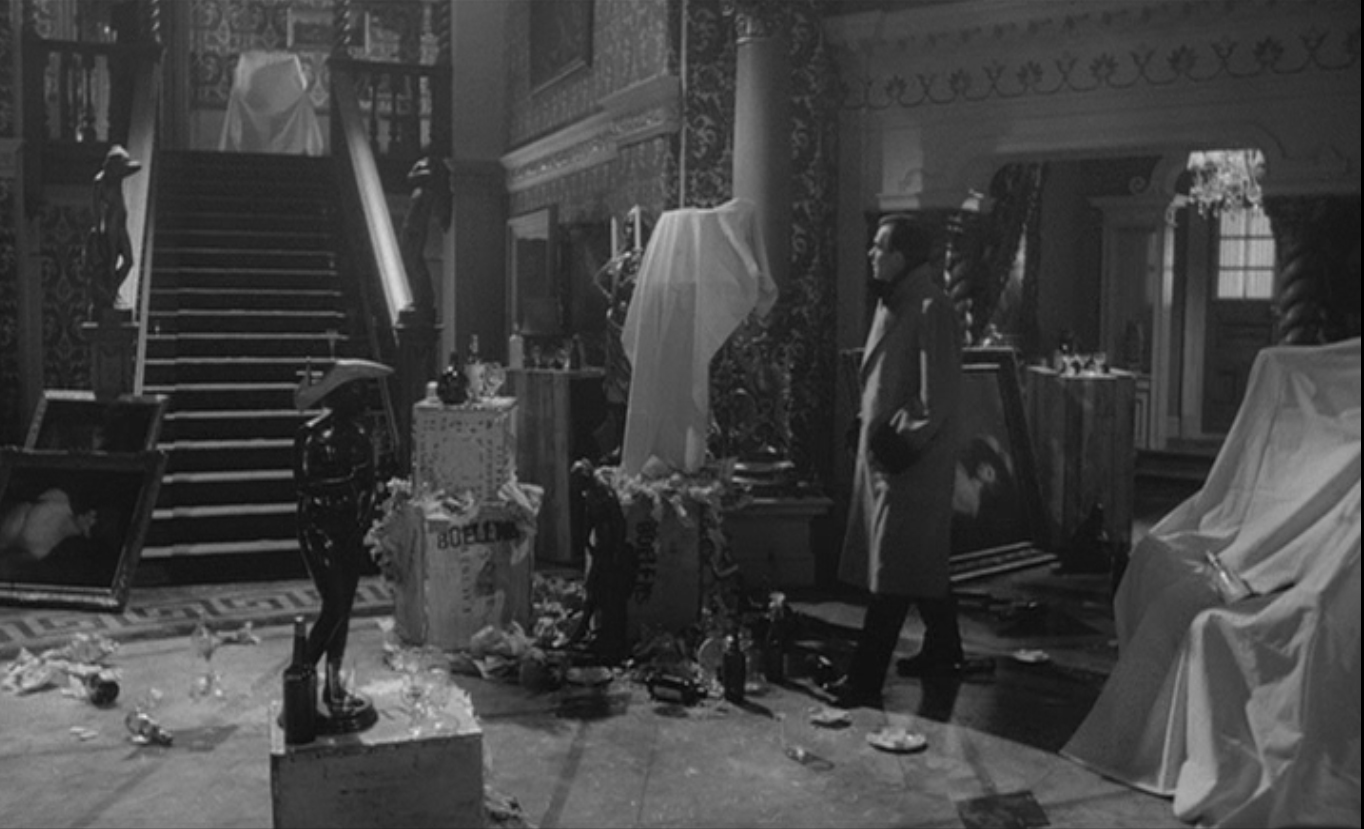
Go to TOC for this film ( (which has also a statement on purpose and manner of analysis and a disclaimer as to caveat emptor and my knowing anything authoritatively, which I do not, but I do try to not know earnestly, with some discretion, and considerable thought).
A NOTE ON THIS ANALYSIS. I COMPARE, SCENE BY SCENE, AT THE END OF EACH, KUBRICK'S FILM WITH NABOKOV'S SCREENPLAY. I HAVE ALSO UNDERLINED THAT DIALOGUE WHICH IS FROM THE NABOKOV SCREENPLAY BUT WHICH IS USUALLY PARAPHRASED. DIALOGUE IN THE FILM WHICH WAS IN THE BOOK, BUT NOT IN THE SCREENPLAY, MAY BE UNDERLINED BUT IS OFTEN INSTEAD OUTLINED IN THE COMPARISON SECTION OF EACH SCENE.
TOC and Supplemental Posts | Part 1 | Part 2 | Part 3 | Part 4 | Part 5 | Part 6 | Part 7 | Films Home
LINKS TO SECTIONS OF THE ANALYSIS ON THIS PAGE:
The Letter, Shot 463
Through City Streets, Towards Mrs. Schiller, Shot 464 through 473
Locations. Partition Street.
Richmond, Virginia Location and its Relationship to Edgar Allen Poe
Mrs. Dick Schiller, Shots 474 through 539
Mrs. Dick Schiller, Comparing Nabokov and Kubrick
The Gun and Chess
Quilty's Presence in the Scene
Humbert's Tears Prefigured
The Ranch and the Coronation Ceremony
Richard Schiller's Deafness, Ode to Joy, and Bill's Cut Thumb
Year Conflict
That Pin-up Girl in the Hood
Where are you hiding, Dolores Haze?...I talk in a daze, I walk in a maze...
Hitchcock's Vertigo
So, Was Lolita a Love Story?
A Parting Observation
463 CU Typewriter. (2:07:30)
THE LETTER (dated March 19th):
Dear dad. How are you doing? I have gone through much sadness and hardship. I'm married. I'm going to have a baby. I'm going nuts because we don't have enough money to pay our debts and get out of here. Please send us a check.
Fade to black.
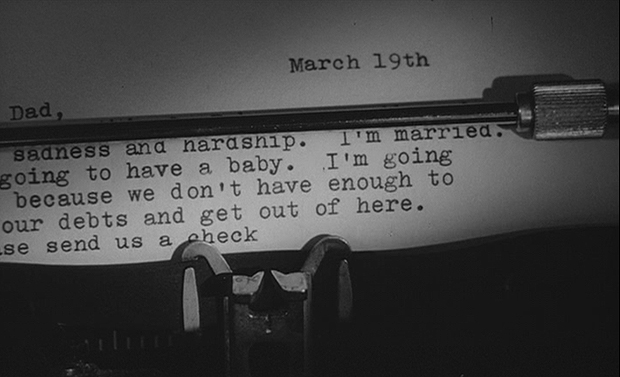
464 LS of downtown city street. (2:18:44)
465 LS Wagon, from the rear, traveling through a city neighborhood. (2:18:49)
466 LS from above of the wagon passing a junkyard. (2:18:59)
467 LS The wagon travels toward us down a city street away from a river. (2:19:10)
468 LS The wagon rounds a corner and parks. (2:10:13)
469 MS of Humbert pulling a gun out of the glove compartment and putting it in his pocket. (2:19:22)
470 LS Humbert exiting the car. (2:19:33)
471 MLS Humbert approaching the gate. (2:19:42)
We see Richard T. Schiller on the mailbox.
472 LS Humbert approaches the front door, 720 the house number above it. (2:19:47)
473 CU Humbert. (2:20:00)
Shot 464 | Shot 465 |
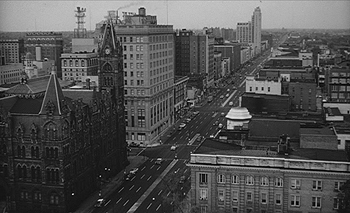 | 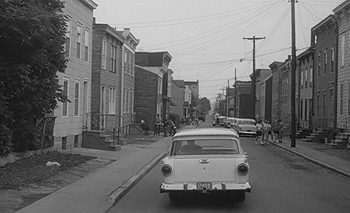 |
Shot 466 | Shot 467 |
 | 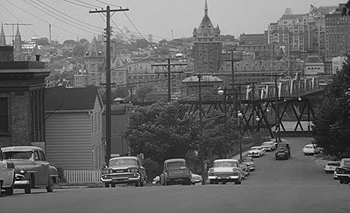 |
Shot 468 | Shot 469 |
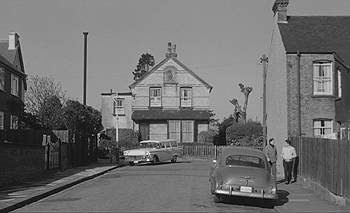 | 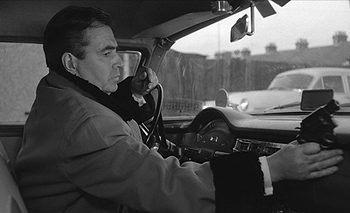 |
Shot 470 | Shot 471 |
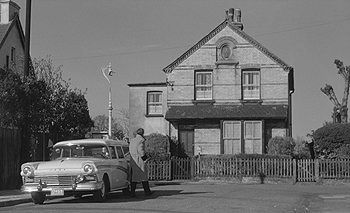 | 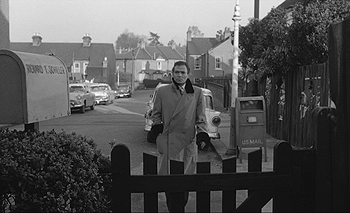 |
Shot 472 | Shot 473 |
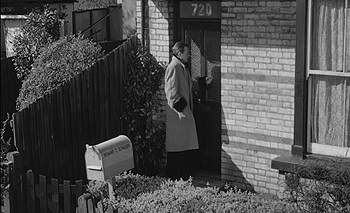 | 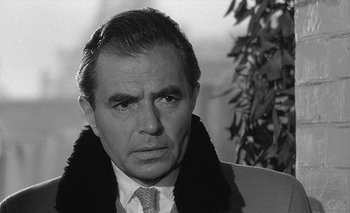 |
Part of the drive to the Schiller household takes us to about 35 Partition Str. in Rensselaer NY, looking back over the Hudson River to the SUNY administration building in Albany which used to be the Delaware and Hudson Railroad building. Below is the location for shot 467. It is easily identified by the first building on the left.
The Schiller House is on Grover Road in Watford, Hertfordshire.
I'm fairly amused by shot 472 being the one in which we get the close look of the Schiller door and its number which is 720. A reason I'm amused is that 4 is the number of D which is daleth, door. Perhaps purely coincidence here.
For more on shot 467 see the post Lolita – Renssalaer, New York, Partition Street Location in Shot 467.
Shot 464 is in Richmond Virginia. For more on this and its relationship to Edgar Allen Poe, see the post Lolita, Richmond, Virginia, and Edgar Allen Poe. Wouldn't you know that Kubrick would take us through old stomping grounds of Poe to reach Lolita.
474 MCU Lolita. (2:20:03)
LOLITA:
Well, gee, what a surprise!
475 CU Humbert. (2:20:07)
HUMBERT:
So, this is what Mrs. Richard T. Schiller looks like
476 MCU Lolita. (2:20:13)
LOLITA: I'm afraid you'll have to excuse my appearance, but you've caught me on ironing day.
477 CU Humbert. (2:20:18)
478 MCU Lolita. (2:20:20)
LOLITA: Oh, but do come in.
Shot 474 | Shot 475 |
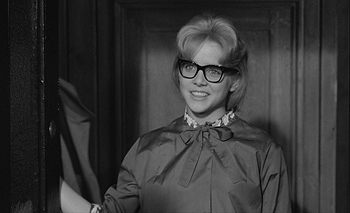 | 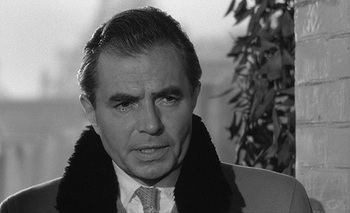 |
Shot 476 | Shot 477 |
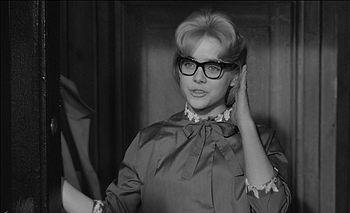 | 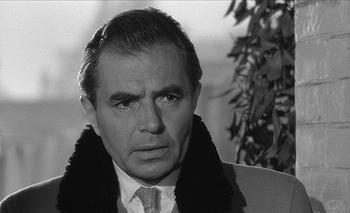 |
Shot 478 | Shot 479 |
 |  |
479 MLS Humbert entering. (2:20:21)
LOLITA:
You're looking marvelous! Can I take your coat?
HUMBERT:
No, I'd rather keep it.
LOLITA:
I wrote to you about a week ago. I was beginning to think you were sore or something. I must say I wouldn't blame you if you were.
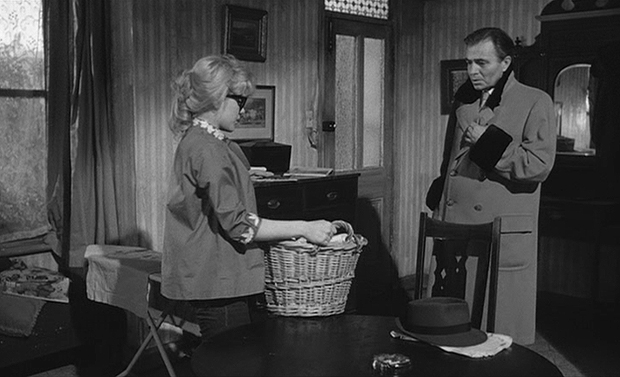
A reather eerie reverberation effect now enters her voice briefly that makes the scene even more surreal and theatrical.
LOLITA: A fine thing me dropping out of sight for so long and then writing you for a handout. Would you like a cup of coffee?
HUMBERT:
No, thank you...
LOLITA:
Or a drink, maybe?
HUMBERT:
No.
LOLITA (bending over and putting down the basket):
I won't be able to do that in another month.
HUMBERT:
Is that him? The one facing us.
LOLITA:
Yes, that's Dick. He doesn't know a thing about you and me, so please watch what you say.
HUMBERT:
That's ridiculous! You don't expect me to believe that, do you?
LOLITA:
Why not? You don't think I'd tell him, do you?
HUMBERT:
Who does he think that I am?
LOLITA:
My stepfather!
HUMBERT:
Then this isn't the man who took you from the hospital?
LOLITA:
No, of course not!
480 MS Humbert and Lolita. (2:21:21)
HUMBERT:
How long have you known him?
LOLITA: About a year. I met him in Phoenix. I was working as a waitress.
HUMBERT: Who is the man...
481 Lolita from behind Humbert. (2:21:29)
HUMBERT:
...that I'm looking for?
LOLITA: There's no point in going into that. It's all over.
HUMBERT: Lolita, I have to know.
LOLITA: Well, I'm sorry, but I can't tell you.
482 MS Humbert. (2:21:38)
HUMBERT:
Look, Lolita, I have a perfect right to know this.
483 MLS Lolita. (2:21:43)
LOLITA:
Oh, crimeny! I should never have written to you.
484 MLS Humbert sitting next to Lolita. (2:21:47)
HUMBERT:
You wouldn't have written to me if you hadn't needed the money. Now, if you're a sensible girl, and if you want what I've come to give you, you'll tell me what I want to know.
485 MLS Lolita standing. (2:21:58)
LOLITA:
Do you remember Dr. Zemph?
486 MLS Humbert. (2:22:06)
HUMBERT:
Dr. Zemph?
LOLITA:
That German psychologist that came to see you at Beardsley.
HUMBERT:
Was it him?
487 MS Lolita. (2:22:13)
LOLITA: Not exactly.
HUMBERT: I didn't come here to play guessing games. Tell me who it was.
LOLITA (moving to wash out a cup in the sink): Well, give me a chance to explain.
HUMBERT:
All right.
LOLITA (pouring a cup of coffee):
Do you remember that car that used to follow us around?
488 MLS Humbert. (2:22:50)
HUMBERT:
The night you disappeared? Yes, I remember him very well.
491 MLS Lolita. (2:22:56)
LOLITA:
And yet, you still haven't guessed?
492 MLS Humbert. (2:22:59)
HUMBERT:
I told you that I'm not playing games with you. Tell me who it was.
Shot 481 | Shot 482 |
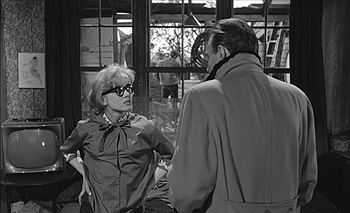 | 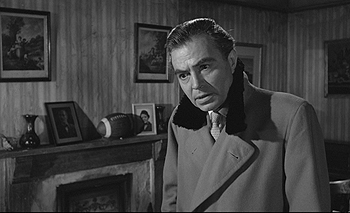 |
Shot 483 | Shot 484 |
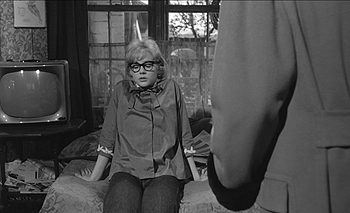 | 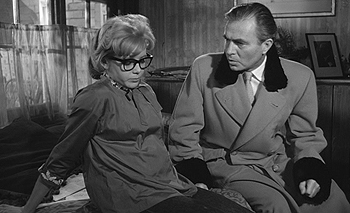 |
Shot 485 | Shot 486 |
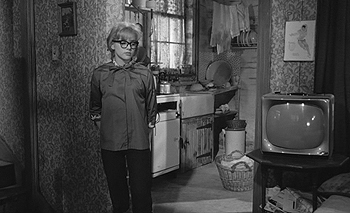 | 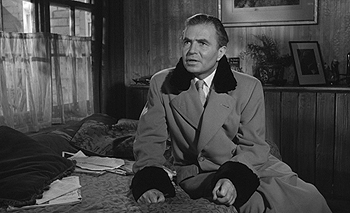 |
Shot 487 | Shot 488 |
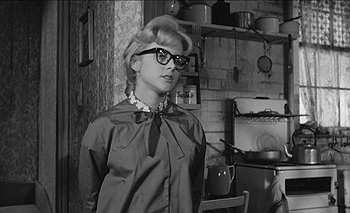 | 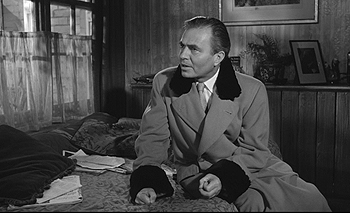 |
Shot 489 | Shot 490 |
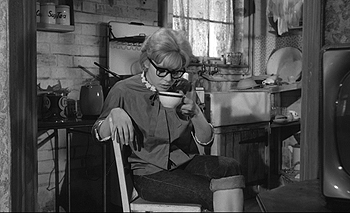 | 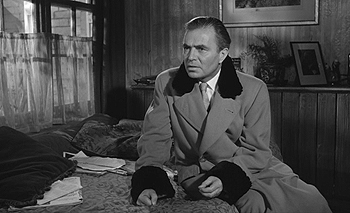 |
Shot 491 | Shot 492 |
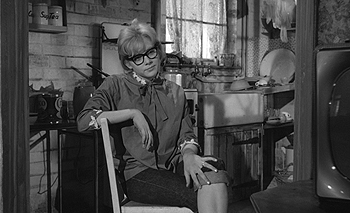 | 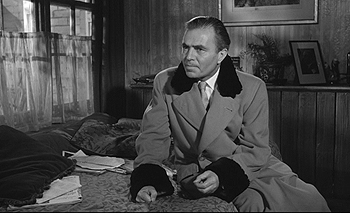 |
493 MLS Lolita. (2:23:04)
LOLITA:
It was Clare Quilty.
494 MLS Humbert. (2:23:09)
HUMBERT:
Who was Clare Quilty?
495 MLS Lolita. (2:23:11)
LOLITA:
All of them, of course.
496 MLS Humbert. (2:23:13)
HUMBERT:
You mean, Dr. Zemph, he was Clare Quilty?
LOLITA:
Well, congratulations.
497 MS Lolita and Humbert. (2:23:17)
LOLITA:
I don't suppose it ever occurred to you that when you moved into our house my whole world didn't revolve around you. You see, I'd had a crush on him ever since the times that he used to come and visit Mother. He wasn't like you and me. He wasn't a normal person. He was a genius.
498 MCU Lolita. (2:23:38)
LOLITA:
He had a kind of uh beautiful Japanese oriental philosophy of life.
499 MS Lolita and Humbert. (2:23:47)
LOLITA:
You know that hotel we stopped at on the way back from camp? It was just by accident that he was staying there, but it didn't take him long to figure out what was going on between us. And from that moment on he was up to every trick he could think of.
500 MCU Humbert. (2:23:59)
HUMBERT:
And he did all these brilliant tricks for the sheer fun of tormenting me?
501 MCU Lolita. (2:24:03)
LOLITA:
Well, sometimes he had to, like the German psychologist bit. He had to trick you into letting me be in his play otherwise how would I ever...
502 MCU Humbert. (2:24:13)
LOLITA: ...get to see him?
HUMBERT:
So that's why you wanted to be in the play?
503 MCU Lolita. (2:24:15)
LOLITA:
That's right.
504 MCU Humbert. (2:24:19)
HUMBERT: And all those afternoons you were supposed to be practicing the piano, you were actually with this man?
505 MCU Lolita. (2:24:21)
LOLITA:
I guess he was the only guy I was ever really crazy about.
506 MCU Humbert. (2:24:26)
HUMBERT:
Aren't you forgetting something?
Shot 493 | Shot 494 |
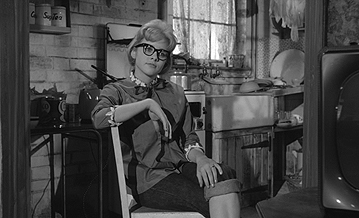 | 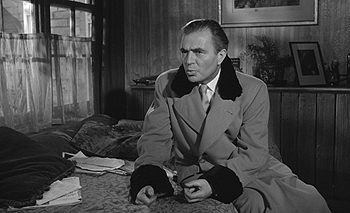 |
Shot 495 | Shot 496 |
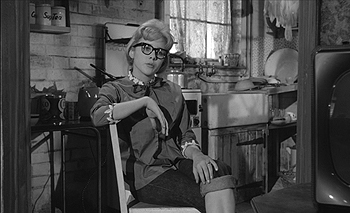 | 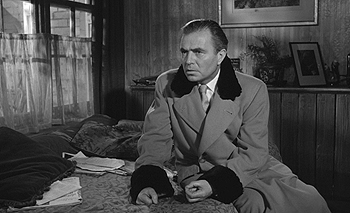 |
Shot 497 | Shot 498 |
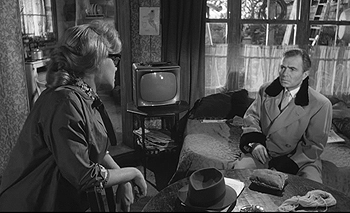 | 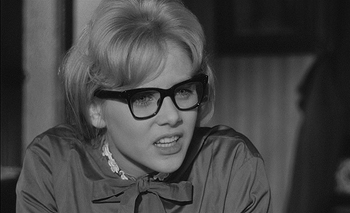 |
Shot 499 | Shot 500 |
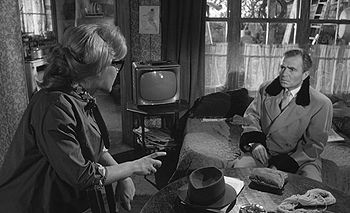 | 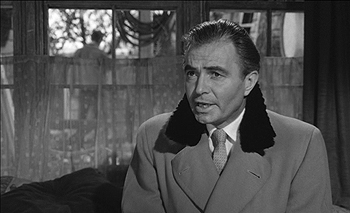 |
Shot 501 | Shot 502 |
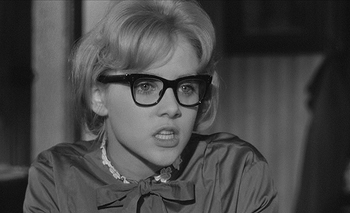 | 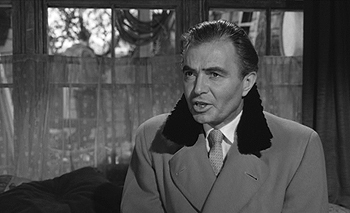 |
Shot 503 | Shot 504 |
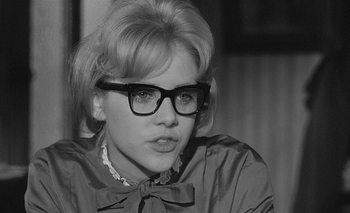 | 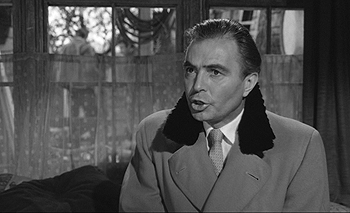 |
Shot 505 | Shot 506 |
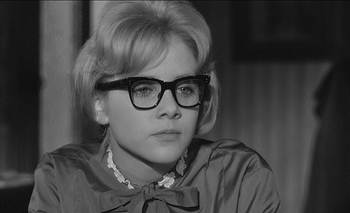 | 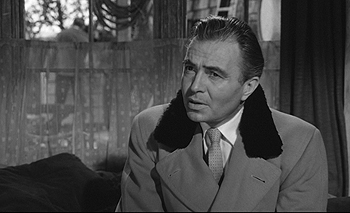 |
507 MLS Lolita. (2:24:30)
LOLITA:
Oh, Dick. Dick's very sweet. We're very happy together, but I guess it's just not the same thing.
508 MLS Humbert from behind Lolita. (2:24:40)
HUMBERT:
And I? I suppose I never counted, of course.
LOLITA:
You have no right to say that. After all, the past is the past.
HUMBERT:
What happened to this Oriental-minded genius?
509 MS Lolita. (2:24:57)
LOLITA:
Look, don't make fun of me. I don't have to tell you a blasted thing.
510 MCU Humbert. (2:25:02)
HUMBERT:
I'm not making fun of you. I'm merely trying to find out what happened. When you left the hospital, where did he take you?
511 MS Lolita. (2:25:07)
LOLITA:
To New Mexico.
HUMBERT:
Whereabouts in New Mexico?
LOLITA:
To a dude ranch near Santa Fe.
512 MCU Humbert. (2:25:12)
LOLITA:
The only problem with it was, he had a bunch of weird friends staying there.
HUMBERT:
What kind of weird friends?
LOLITA:
Weird...
513 MLS Lolita from behind Humbert. (2:25:22)
LOLITA:
...painters, nudists, writers, weight-lifters. I figured I could take anything...
514 MLS Humbert from behind Lolita. (2:25:25)
LOLITA:
...for a few weeks 'cause I loved him and he was on his way to Hollywood to write one of those spectaculars, and he promised to get me a studio contract...
515 MS Lolita. (2:25:34)
LOLITA:
...but it never turned out that way and instead he wanted me to cooperate with the others making some kind of a, you know, an art movie.
516 MLS Humbert from behind Lolita. (2:25:41)
HUMBERT:
An art movie!
LOLITA:
Yeah.
HUMBERT:
And you did it?
LOLITA:
No, I didn't do it. So he kicked me out.
HUMBERT: You could have come back to me.
Shot 507 | Shot 508 |
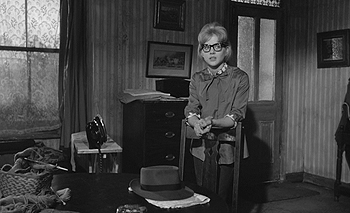 | 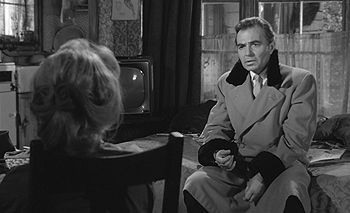 |
Shot 509 | Shot 510 |
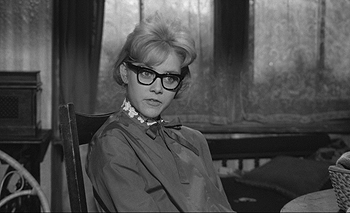 | 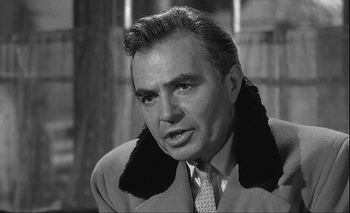 |
Shot 511 | Shot 512 |
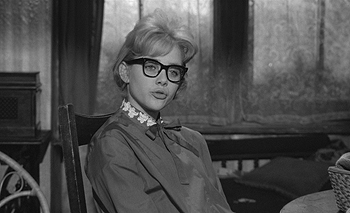 | 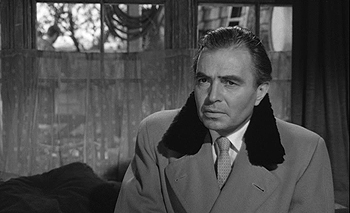 |
Shot 513 | Shot 514 |
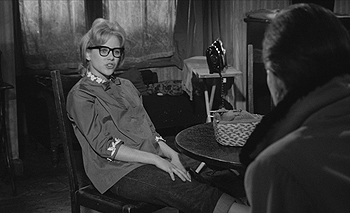 | 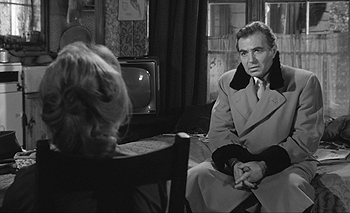 |
Shot 515 | Shot 516 |
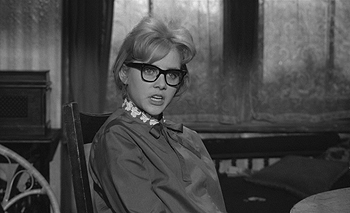 | 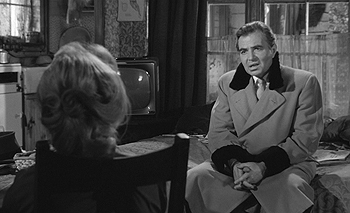 |
517 MS Lolita. (2:25:57)
518 MLS Humbert and Lolita. (2:25:58)
A knock on the window and Dick and Bill enter.
DICK:
Oh, excuse me, sweetheart, Bill's cut his thumb.
BILL:
It's just a scratch.
LOLITA:
Dick, this is my stepfather, Professor Humbert.
DICK (shaking hands): Oh, how do you do, Professor?
HUMBERT: How do you do?
LOLITA:
This is our neighbor, Bill Crest.
BILL: Glad to meet you, Professor.
HUMBERT: How do you do?
DICK: Well, gee, Lo's told me so much about you.
LOLITA (going into the kitchen): Well, I guess we might as well fix that thumb.
DICK:
This is a grand surprise, Professor. When you didn't answer the letter we were afraid that you were still sore at Lo for having run away from home.
HUMBERT: Oh, yes.
DICK (reaching in the refrigerator): How about a beer?
HUMBERT: No, thank you.
DICK: I'll bet you you're dry after that long drive. This is some of that foreign beer. I'm sure you'll like it.
HUMBERT:
No beer, thank you.
LOLITA:
Bandages are upstairs.
Dick opens two beers, the spray jetting on Humbert's coat.
DICK: Oh, I'm sorry.
HUMBERT: That's all right.
DICK: Can I get you anything else? Are you hungry?
HUMBERT: Nothing, thank you.
LOLITA:
How are you two getting along?
DICK:
Just fine.
LOLITA (to Humbert): You'll have to speak up. His phone's on the blink.
He and Lolita sit on the couch.
LOLITA:
One of those for me?
DICK (hands Lolita a beer):
Sure, hon. (To Humbert.) I hope you're planning on staying awhile.
519 MLS Humbert. (2:27:15)
DICK:
You caught us a little unprepared but we'll try and make you feel at home.
HUMBERT:
I shall have to be on my way, I'm afraid.
520 MS Dick and Lolita. (2:27:22)
DICK:
You can have the bed upstairs. We sleep down here because Lo likes to watch the TV.
LOLITA:
He can't stay, Dick.
DICK:
What a shame. I wish you could.
521 MS Humbert. (2:27:31)
522 MS Dick and Lolita. (2:27:33)
LOLITA:
Why don't you tell him about Alaska?
DICK:
Yeah. I guess Lo explained to you about going to Alaska and all that, in the letter. It's a marvelous opportunity up there. An opportunity for a guy like me to get in on the ground floor. Industry's opening up and if we can scrape together enough money with maybe your help, well, we can go. We've got a few back debts...
523 MS Humbert. (2:27:31)
DICK: ...we kind of over-extended ourselves.
524 MS Dick and Lolita. (2:27:58)
LOLITA: How are the Farlows?
525 MS Humbert. (2:28:00)
HUMBERT: John Farlow's quite all right. It was he who gave me your letter, of course.
DICK: She's sure a swell kid, Professor Haze. She sure is. She's just nuts about dogs and kids. She's going to make a swell mother, too.
526 MS Dick and Lolita. (2:28:13)
DICK:
Alaska's a great place for kids, you know. Lots of room for them to run around.
527 MS Humbert. (2:28:17)
Bill comes down the stairs.
BILL:
Well, it's as good as new.
528 MLS Dick and Lolita. (2:28:22)
DICK: Well, we'd better get back to work, Bill. I guess you two have a lot to talk about.
BILL: It's been a pleasure meeting you, Professor.
HUMBERT: Thank you.
DICK: When you've finished, Dad, I hope you don't mind me calling you that, come out back and I'll show you what I'm making for the kid.
HUMBERT: Thank you.
DICK:
Just holler, sweetheart, if you want me for KP.
Shot 517 | Shot 518 |
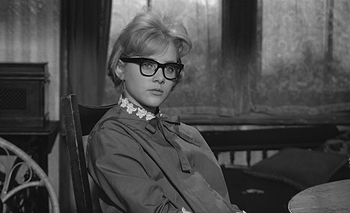 | 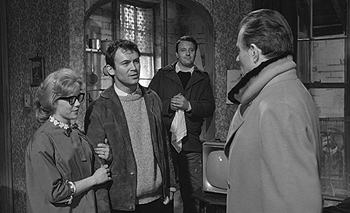 |
Shot 519 | Shot 520 |
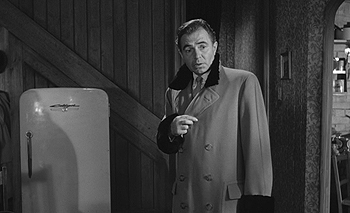 | 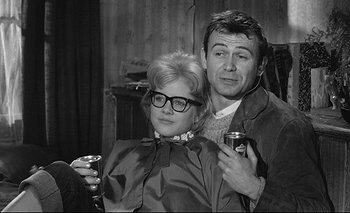 |
Shot 521 | Shot 522 |
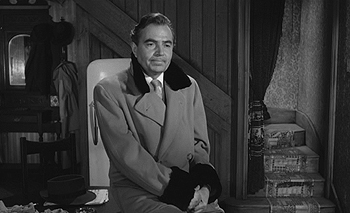 | 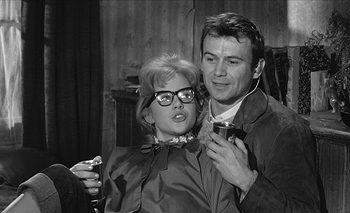 |
Shot 523 | Shot 524 |
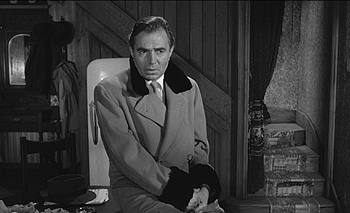 | 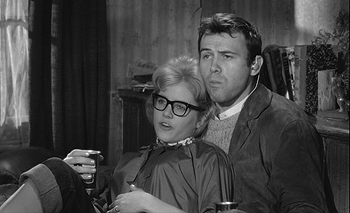 |
Shot 525 | Shot 526 |
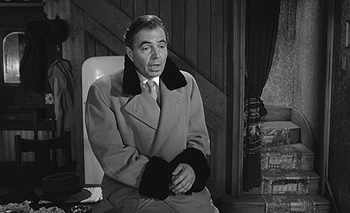 | 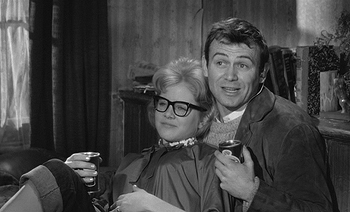 |
Shot 527 | Shot 528 |
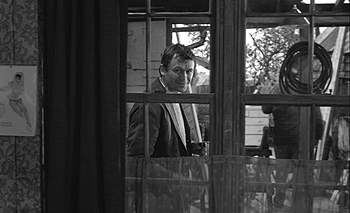 | 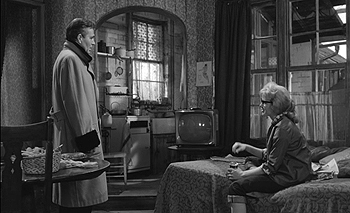 |
529 MCU Humbert and Lolita. (2:28:45)
LOLITA (takes off her glasses): Dick's awfully sweet, isn't he?
HUMBERT (seizes her arm):
Come here.
LOLITA:
What's going on? What are you doing?
HUMBERT: This may be neither here nor there...
530 MCU Humbert from behind Lolita. (2:28:57)
HUMBERT: ...but I've got to say it. Life is very short. Between here and that old car outside are 25 paces. Make them, now, right now.
LOLITA:
What?
HUMBERT:
Come away with me now, just as you are.
LOLITA:
You mean you'll give us the money only if I go to a hotel with you?
HUMBERT:
No, you've got it all wrong.
I want you to leave your husband and this awful house. I want you to live with me and die with me and everything with me.
LOLITA: You must be crazy.
HUMBERT: No, I'm perfectly serious, Lo. I've never been less crazy in all my life. We'll start afresh. We can forget everything that has happened.
LOLITA: No, it's too late.
HUMBERT: No, it's not too late.
LOLITA:
Will you please keep your voice down.
HUMBERT:
All right. But don't tell me it's too late, because it's not. If you want time to think, that's all right because, after all, I've waited already for three years and I think I could wait for the rest of my life if necessary. You're not giving anything up, there's nothing here to keep you. All right, don't tell me, this man is married to you, but that's purely incidental. It was an accident that you met him in the first place. You're not bound to him in any way, whereas you are bound to me by everything that we have lived through together, you and I.
LOLITA:
I'm going to have his baby in three months.
HUMBERT:
I know.
LOLITA:
I've ruined too many things in my life. I can't do that to him, he needs me.
Humbert begins crying.
LOLITA: Oh, come on now, don't make a scene. Stop crying! He can walk in here at any minute. Will you please stop crying?
531 Humbert and Lolita. (2:30:27)
Humbert has pulled a wallet out of his coat.
HUMBERT (taking out some money): There are no strings attached, it's your money anyway, it comes from the rent of the house. There's $400 in cash.
LOLITA (taking the money): Four hundred dollars!
HUMBERT (hands her the check):
I've made out a check here for $2,500. There's someone in Ramsdale who's prepared to take care of the mortgages on the house and make a down payment of $10,000. Here's the papers.
LOLITA (taking the papers): You mean we're getting $13,000? That's wonderful!
532 CU Humbert and Lolita. (2:31:18)
LOLITA:
Oh, come on now, don't cry. I'm sorry. Try to understand. I'm really sorry that I cheated so much but I guess that's just the way things are.
Lolita touches Humbert's hand and he jumps up and flees.
533 MS Humbert and Lolita. (2:31:42)
LOLITA: Hey, where are you going?
534 MCU Lolita at the door. (2:31:46)
Shot 529 | Shot 530 |
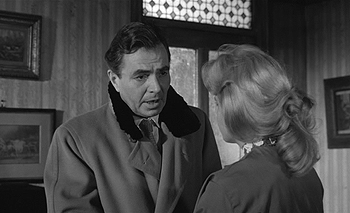 | 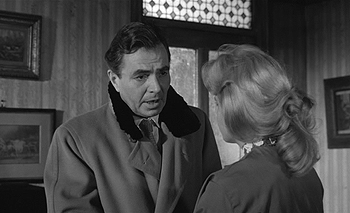 |
Shot 531 | Shot 532 |
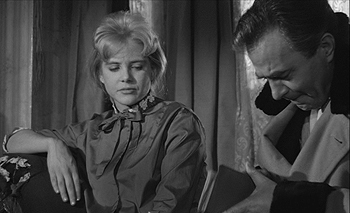 | 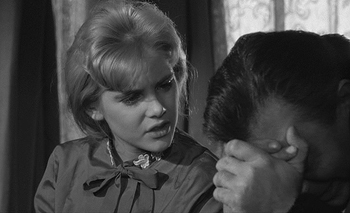 |
Shot 533 | Shot 534 |
 | 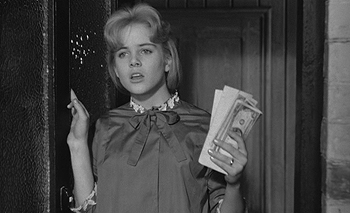 |
535 LS Humbert running to the car. (2:31:48)
LOLITA:
Hey, well, listen!
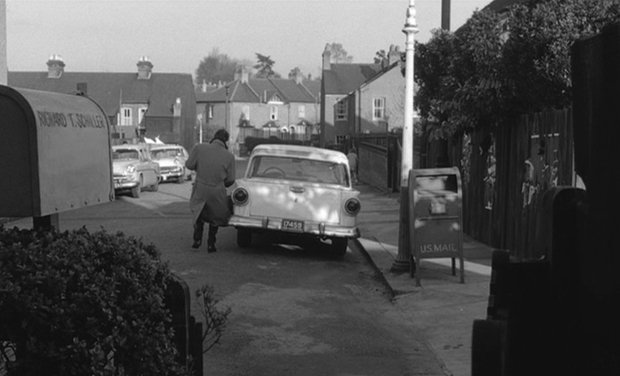
536 MCU Lolita at the door. (2:31:50)
LOLITA: Let's keep in touch.
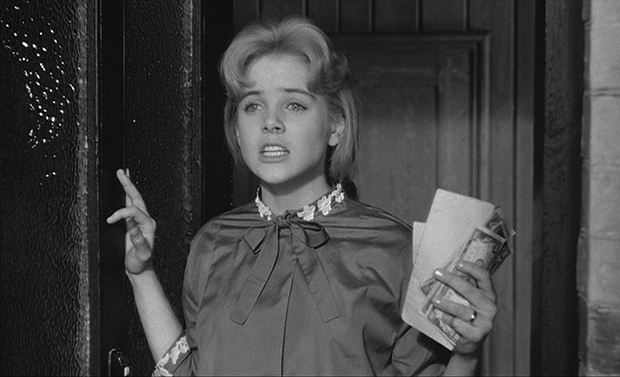
537 Humbert climbing in his car. (2:31:52)
LOLITA:
I'll write to you when we get to Alaska!
Crossfade Humbert driving away to shot 537.
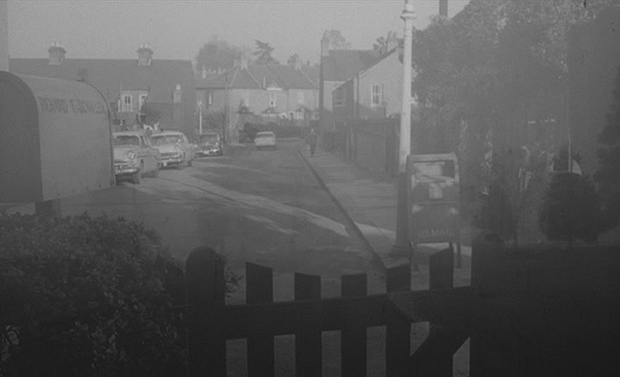
538 Humbert driving through the mist. (2:32:04)
This is a repeat of shot 2 with a different focal length.
Cross fade to the interior of Quilty's house.
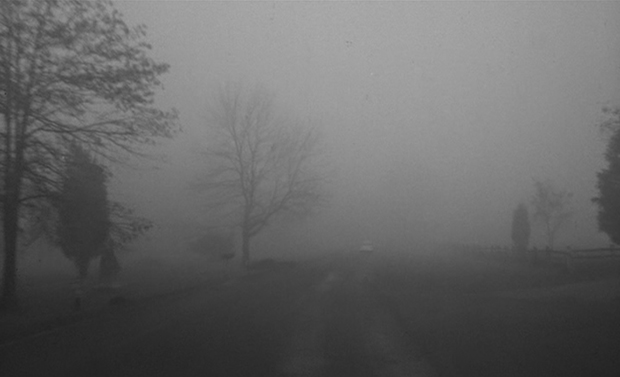
539 Humbert already inside Quilty's home. (2:32:09)
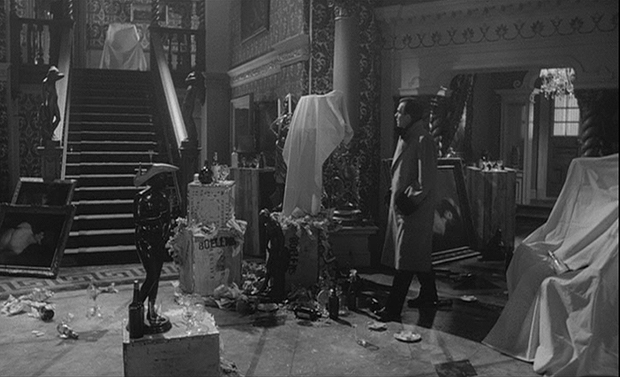
HUMBERT: Quilty!
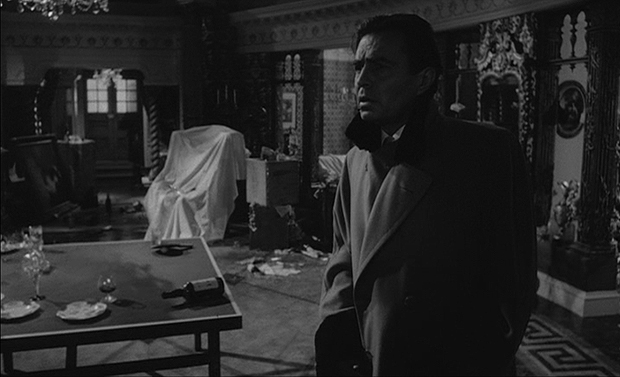
HUMBERT: Quilty!
In the screenplay, after losing Lolita, Humbert stays at a sanitarium for a while for sake of his health then returns to Beardsley college. One day he approaches the room in which he will be giving an exam and finds on it the number 342. Circularity. Coincidence. The number of the Haze home and the hotel room at the Enchanted Hunters Hotel (Kubrick had changed it to 242 in the film and we have no such exam room scene in the movie). In room 342, Humbert opens a letter he's received and it is the one from Lolita, phrased only slightly differently from in the film and with a little more information on Dick's job.
Next we see him on a Hunter Road, finding Lolita's home. The film has an extended period of discussion, from shot 475 to 517, before Humbert and Dick and Bill meet. Instead, in the screenplay, Lolita immediately introduces him to Dick and Bill, Dick having had no idea that Lolita had written Humbert. They converse briefly then go back outside to work, and Humbert interrogates her on who she ran off with, she divulging it was Clare Quilty. Their conversation in the film paraphrases that in the screenplay. When it comes to the point when Humbert tells her she could have come back to him she says she was afraid he would kill her, and tells a little about waitressing and eventually meeting Dick.
Narrative is added then about Humbert realizing he loves Lolita.
I looked and looked, and knew that I loved her more than anything I had ever seen, or imagined, or hoped for...She was only the dead-leaf echo of my numphet--but thank God it is not that echo alone that I worshiped. I loved my Lolita...even if those eyes of hers would fade to myopic fish, and her nipples swell and crack--even then I would go mad with tenderness at the mere sight of your dear worn face, at the mere sound of your raucous young voice, my Lolita.
It is then he implores her to leave with him. He says he will even make a brand new God if she will give him the hope that one day she might. She says no. He says it would have made all the difference. As he leaves, she warns him a storm is coming.
The screenplay then moves on to more narrative, the psychiatrist who treated Humbert after he killed Quilty relating how Lolita died giving birth to a stillborn child and Humbert hadn't known of that death before writing the below:
...you are still as much part of blest matter as I am. I can still talk to you and make you live in the minds of later generations. I'm thinking of aurochs and angels, the secret of durable pigments, prophetic sonnets, the refuge of art. And this is the only immortality you and I may share, my Lolita.
End of screenplay.
In the book Humbert is living with Rita when he receives two letters, one from Farlow telling him he is no longer going to take care of his affairs and demanding he produce Lolita, and the next one from...Lolita, dated September 18th.
Humbert pursues and locates where Dick Schiller was living when they married (Killer Street) and then locates her on Hunter Road.
As in the film, he does not immediately meet Dick but instead begins interrogating Lolita about the man who she'd left with, Humbert recognizing that Dick is not the man for whom he's looking. She refuses to tell him, then when he threatens to leave, she confesses who it was, the only man she had ever been crazy about. What about Dick? He was a lamb but it wasn't the same etc. Had Humbert never counted? The past was past and she guessed he had been a good father. She relates how she had met Quilty when she was ten and he had pulled her on his lap and kissed her. He had seen them at the inn. She felt it had been horrid of her to sidetrack him into believing Clare was an old female. She further felt that the world was one big gag after another and if someone wrote up her life no one would believe it.
At this point, Dick, who is hard of hearing and a veteran, enters with Bill who has only one arm. They have beer. Dick thinks Humbert's going to stay there and Humbert says he's just passing through. Humbert realizes that Bill's one thumb is bleeding, and Lolita takes him to the kitchen to bandage him up. Dick talks about what a swell mother Lolita will make.
Dick goes back outside, and as Lolita smokes, "Gracefully, in a blue mist, Charlotte Haze rose from her grave." Humbert accuses her of betraying him and demands to know where Quilty is. She says there had been no betrayal as Humbert was among friends with Quilty as he too liked little girls and had been jailed once. She asserts he was a genius. He took her to a dude ranch that was lush and had a waterfall and they had gone through a coronation ceremony, a ducking, "as when you cross the Equator." His Hollywood promises didn't work out. He was an addict, a sex freak and his friends were his slaves. She refused to take part in his friends' "movie pictures" and Quilty kicked her out.
I...looked at her, and knew as clearly as I know I am to die, that I loved her more than anything I had ever seen or imagined on earth, or hoped for anywhere else. She was only the faint violet whiff and dead leaf echo of the nymphet I had rolled myself upon with such cries in the past...but thank God it was not that echo alone that I worshiped...You may jeer at me, nad threaten to clear the court, but until I am gagged and half-throttled, I will shout my poor truth. I insist the world know how much I loved my Lolita, this Lolita, pale and polluted...still mine...No matter, even if those eyes of hers would fade to myopic fish...
Etcetera. He begs her to leave with him, as in the film and screenplay. Think it over, at least. With "no strings attached", he hands over her trousseau. She begs him to stop crying and apologizes for having cheated so much. "...but that's the way things are."
Leaving, he drives off in search of Quilty.
Unless it can be proven to me--to me as I am now, today, with my heart and my beard, and my putrefaction--that in the infinite run it does not matter a jot that a North American girl-child named Dolores Haze had been deprived of her childhood by a maniac, unless this can be proven (and if it can, then life is a joke), I see nothing for the treatment of my misery but the melancholy and very local palliative of articulate art.
He reflects, as he drives, on how horrible he had treated her, how he had loved her and had still done these things to her.
He revisits Ramsdale then finds Pavor Manor (Fear/Dread/Terror Manor), where Quilty stays.
Bang bang. He executes Quilty though Humbert later says he doesn't believe in capital punishment and assumes his judge will be opposed to it as well.
The book ends much as does the screenplay.
...while the blood still throbs through my writing hand, you are still as much part of blessed matter as I am, and I can still talk to you from here to Alaska. Be true to your Dick. Do not let other fellows touch you. Do not talk to strangers. I hope you will love your baby. I hope it will be a boy. That husband of yours, I hope, will always treat you well, because otherwise my specter shall come at him, like black smoke, like a demented giant, and pull him apart nerve by nerve. And do not pity C.Q. One had to choose between him and H.H. and one wanted H.H. to exit at least a couple of months longer, so as to have him make you live in the minds of later generations. I am thinking of aurochs and angels, the secret of durable pigments, prophetic sonnets, the refuge of art. And this is the only immortality you and I may share, my Lolita.
A point is made of Humbert examining a box with an elaborate Oriental design on the lid, which had been given him by "Gros Gaston" to hold chessmen, a cheap money box called a "luizetta" that could be purchased in Algiers. The box turns out to be too small for chess pieces so Humbert instead uses it for Chum, his nickname for his gun.
Lolita wears glasses that could have belonged to Quilty. It is only when she takes them off, saying "Dick's awfully sweet", that Humbert grasps her and pulls her to the door, proclaiming, "This may be neither here nor there..." and begs her to leave with him, insisting she's no connection with Dick despite the child, that he is simply an "accident". If we reflect back on Lolita's intrusion on Charlotte's attempted seduction of Humbert after the dance, it was when Lolita quizzed her mother on Quilty, saying all the girls were crazy about him, too, that Charlotte retorted, "That's neither here nor there."
Humbert's tears are prefigured in the painting that hung outside his bedroom/study at the Haze household.
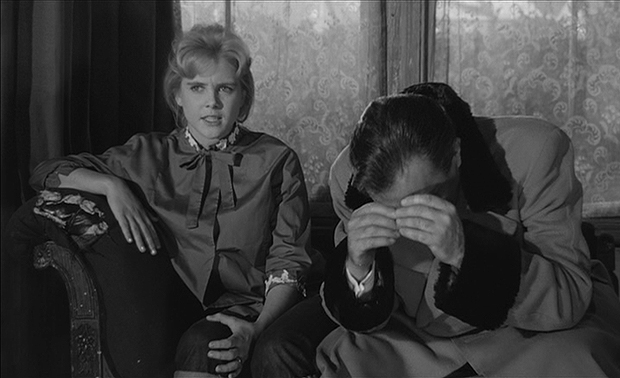

Kubrick leaves out the name of the ranch, which was Duk Duk, and that Quilty and Lolita went through a crossing the equator style of coronation ceremony upon their arrival.
Duk Duk, in the annotated Lolita, is given as probably having something to do with sex.
...an obscene Oriental word for copulation, sometimes rendered in English as dak or dok, from the Persian dakk (vice, evil condition) and dokhtan (to pierce). No less "an amateur of sex lore" than Quilty, H.H. gleaned this from a sixteenth-century work, The Perfumed Garden of the Cheikh Nefzaoui, a Manual of Arabian Erotology (188), translated by Sir Richard Burton, the British explorer and Orientalist (the treatise is mentioned by name in Ada).
From The Perfumed Garden of the Cheikh Nefzaoui...
In order to express the movement which takes place in the act of coition, the author uses the word "dok" with reference to the man, and "hez" for the woman. The first of these words means to concuss, to stamp, to pound; it is the action of the pestle in the mortar; the second word signifies a swinging movement, at once exciting, exhilarating, and lascivious.
On a side note...we have the same idea in the Hebrew word daq, small or thin, dwarf, from daqaq, meaning to crush, crumble, beat into pieces, bruise, make dust etc. Doq, from the same, can mean a fine, thin cloth as a curtain.
The crossing the equator ceremony involves (or used to involve) ducking/dunking in water, and cross-dressing. The reason the cross-dressing aspect is of interest is because of the androgyne, such as Vivian Darkbloom who is Nabokov's anagram presence in the film. Also, Quilty had a crossgender aspect with being represented also as a woman in the book.
The reason I look at this at all, wondering as to Kubrick's interest in how to represent this, is because of his use of a dividing line, a 0 point, in his films. The idea of crossing the equator provides another 0 point.
Fredrich Schiller wrote the poem "Ode to Joy", used by Beethoven in the final movement of his "Ninth Symphony". Joy, freude. Twice Nabokov speaks of Harold Haze's pistol, in his possession, and the Freudian implications of it, one of those times being in the presence of the deaf Richard Schiller, as he reflects on the joy of Quilty's impending death, "...If he was silent, I could be silent too. Indeed, I could very well do with a little rest...before I drove to wherever the beast's lair was--and then pulled the pistol's foreskin back and then enjoyed the orgasm of the crushed trigger: I was always a good little follower of the Viennese medicine man..." In this paragraph then we have the deaf Dick Schiller, and joy related to Freud(e). Meanwhile, in the kitchen, Lolita is seeing to Bill's cut thumb. When Humbert inquires about their going to Canada, realizes his lapse and says Alaska, Dick's response is that he supposed Bill had cut it on a jagger, and had lost his arm in Italy. This replicates the phallic imagery, suggested by Humbert with the gun, jagger being a German sharpshooter, from German jager, meaning "huntsman".
Again, the hunter.
The Enchanted Hunter. The Enchanted Hunter's Hotel. The Hunted Enchanters play. Hunter Road, where Humbert finds Lolita living in the book.
Bill and his cut thumb are earlier alluded to in the screenplay when Humbert receives the mail that includes the letter from Lolita. Glancing at his mail he's' taken out of his pigeonhole, he remarks, "This is a circular. This is from a Mrs. Richard Schiller--some graduate student, I presume. This is a fenestrated bill. This is a publisher's list. And this is not for me but for Professor Humphries." Schiller means student. Fenestrated means a window, opening for light. The window in the bill is Bill's cut thumb, as in "This is a fenestrated bill." Nabokov playing with words. If we want to try to take it further we could wonder if this bill, a written statement, ultimately alludes to not the Latin bulla, but instead the animal bull. It seems not too unreasonable when one considers that Nabokov's final lines, in immortalizing Lolita, include thoughts of "aurochs and angels", aurochs being bison/oxen. The Spanish fighting bull resembles the extinct auroch, the bull of the legendary Minotaur.
My conjecture is that the deaf Schiller may have to do with deaf Beethoven's use of Schiller's poem.
And this is of particular interest concerning Kubrick's later choice to film A Clockwork Orange in which Beethoven and the Ode to Joy figure so greatly, Beethoven's very image hanging over Alex's bed, covering his window as well, just as the painting of the pair playing Beethoven's Kreutzer sonata hangs over Humbert's prospective bed in the Haze home.
The film begins with Quilty's death scene. Then, shot 64 begins the flashback to "Four Years Earlier".
The action begins in 1957? The monster movie at the drive-in came out in 1957. Six months later they are at Beardsley. The license plate on the car when the blow-out is had shows the year 1957, which is the more important indication of time.
Entertainment media in the Schiller home sets the story for ending in 1958.
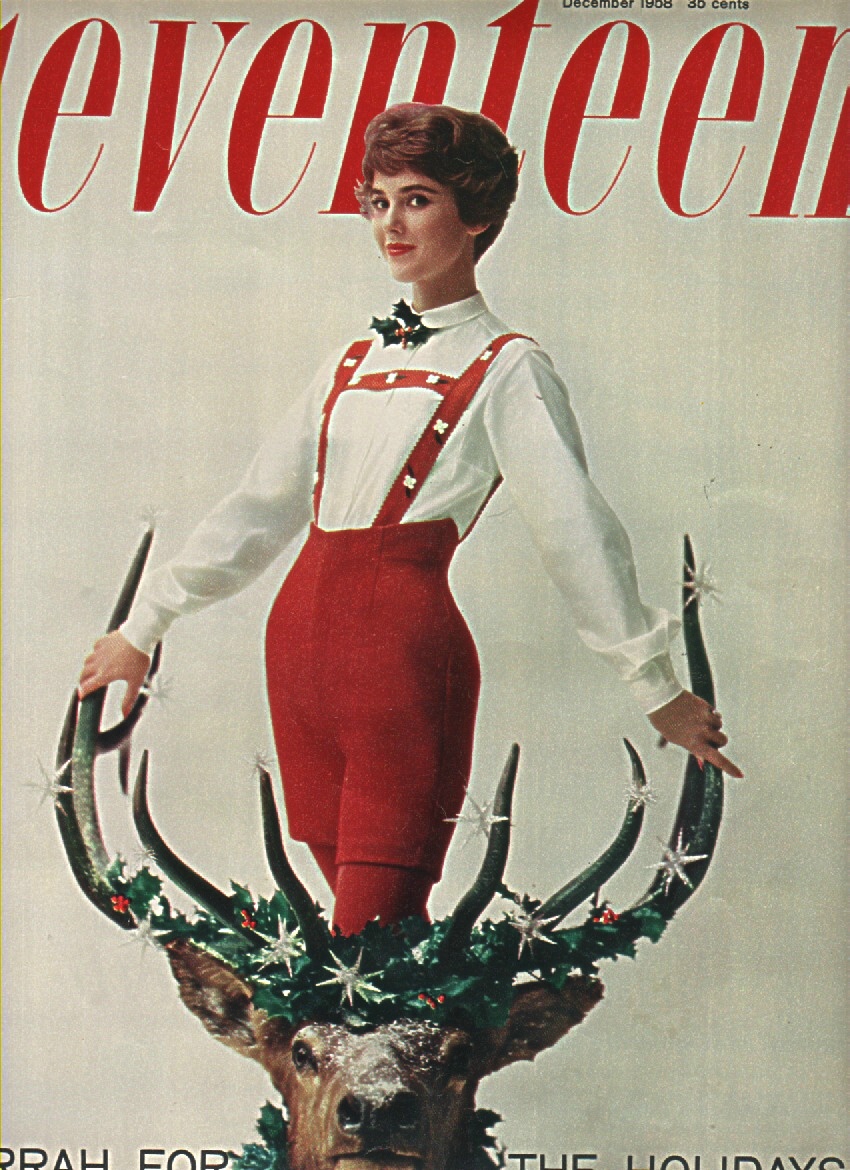
The above image is from somewhere on the web. Kubrick takes care to clearly show us a "Seventeen" magazine on Mrs. Schiller's couch. It is this one, which was published in December 1958. "Hurrah for the Holidays!" with antlers, holly and not-really-lederhosen.
There are so many interpretations that could be made of that cover, what Kubrick intended it to depict.
From a distance it looks like a normal calendar pin-up on the wall behind Lolita in her home. Taking it for granted it was so, I searched high and low for it. No luck at all. If you can identify it let me know, please. One can barely make out that it reads "December" on the lower screen left above the calendar portion.
Lolita, in the film, is 6 months pregnant when Humbert locates her. In the book, she gives birth to a stillborn girl and dies on December 25, 1952 after the move to Alaska. We may have something of this preserved here in the December calendar and the December issue of Seventeen.
There are two things I want to speak of here. The first is that in the book's forward, crafted by Nabokov as written by psychiatrist, John Ray, makes mention of names and places being disguised, except for Lolita, of course. The only name he gives as rhyming with the original is "Haze".
Its author's bizarre cognomen is his own invention; and, of course, this mask--through which two hypnotic eyes seem to glow--had to remain unlifted in accordance with its wearer's wish. While "Haze" only rhymes with the heroine's real surname, her first name is too closely interwound with the inmost fiber of the book to allow one to alter it...
...For the benefit of old-fashioned readers who wish to follow the destinies of the "real" people beyond the "true" story, a few details may be given...
Given the repetitive bull and matador imagery in the Haze household, and Nabokov/Humbert ending the novel speaking of "aurochs and angels", one might wonder if the name Haze rhymes with is Mayes or Maze.
One may be reminded of Lolita herself opting to make a "corny" rhyme of her name in the dim-mid scene in which Humbert reads her part of the Poe poem.
"Thus I pacified Psyche and kissed her
And conquered her scruples and gloom
And we passed to the end of the vista
But were stopped by the door of a tomb
And I said, 'What is written, sweet sister?'
She replied, 'Ulalume, Ulalume'."
Lolita objected, "Well, the 'vista-sista', that's like 'Lolita-sweeta'."
The poem is about an individual trapped in an unconscious circularity by which he returns to the tomb of his beloved without initially recognizing the path. One could say he is a prisoner, which takes us to one of Humbert's poems he would write after Lolita fleeing from him.
Where are you hiding, Dolores Haze?
Why are you hiding, darling?
(I talk in a daze, I walk in a maze
I cannot get out, said the starling)
The maze in which the starling is trapped refers to Nabokov's tale of the partial genesis of Lolita, the story of the ape who, when given charcoal, eventually drew lines which were the bars of its cage. I've already written of this. But who exactly is the parenthetical one in the maze? Humbert? How about Lolita? I would think both of them, despite Lolita's seeming escape. In the poem, Humbert first identifies her as being a "starlet", and Lolita's death will occur in Gray Star, Alaska.
The starling of Humbert's poem comes from two sources. One is A Sentimental Journey by Laurence Stern.
...the Bastile! the terror is in the word--Make the most of it you can, said I to myself, the Bastile is but another word for a tower--and a tower is but another word for a house you can't get out of...but with nine livres a day, and pen and ink and paper and patience, albeit a man can't get out, he may do very well within...and he comes out a better and wiser man than he went in...the Bastile is not an evil to be despised--but strip it of its towers--fill up the fosse--unbarricade the doors--call it simply a confinement, and suppose 'tis some tyrant of a distempter--and not of a man which holds you in it--the evil half vanishes, and you bear the other half without complaint.
I was interrupted in the hey-day of this soliloquy, with a a voice which I took to be of a child, which complained "it could not get out."--I look'd up and down the passage, and seeing neither man, woman, or child, I went out without further attention.
In my return back through the passage, I heard the same words repeated twice over; and looking up, I saw it was a starling hung in a little cage.--"I can't get out--I can't get out," said the starling.
The narrator attempts to release the bird but is unable to do so.
I vow, I never had my affections more tenderly awakened; or do I remember an incident in my life, where the dissipated spirits, to which my reason had been a bubble, were so suddenly call'd home. Mechanical as the notes were, yet so true in tune to nature were they chanted, that in one moment they overthrew all my systematic reasonings upon the Bastile; and I heavily walk'd up stairs, unsaying every word I had said in going down them.
Disguise thyself as thou wilt, still slavery! said I--still thou art a bitter draught; and though thousands in all ages have been made to drink of thee, thou art no less bitter on that account. 'Tis thou, thrice sweet and gracious goddess, addressing myself to LIBERTY, whom all in public or in private worship, whose taste is grateful, and ever wilt be so...
Etcetera. The story of the bird is also given, that it was caught upon the cliffs at Dover "before it could well fly" and was taken to Paris by a the captor who grew fond of it and taught it the four simple words, "I can't get out."
Let's say Kubrick knew of all this, it may be why he chose Dover, New Hampshire for the establishing shot (67) of Ramsdale. I'm going to take it for granted that Kubrick knew a lot about the book he'd chosen to film. For both Nabokov and Kubrick, the reflection on the slavery of the starling would fit Lolita's slavery, Humbert trying to convince her that he lets her do all sorts of things (he doesn't). It fits Humbert's slavery to his obsession (an obsession upon which he acts, thus imprisoning Lolita in it as well). It also fits the Nabokov's description of his characters as being his galley slaves, and as I've pointed out Kubrick takes Burgess to task, as well as King, for the same thing.
Jane Austen refers to the starling also in Mansfield Park, and it's from her that Humbert cribs his line.
"...the sun shines, and the park looks very cheerful. But unluckily that iron gate, that ha-ha, gives me a feeling of restraint and hardship. 'I cannot get out,' as the starling said."
It has struck me how much, in the telephone booth scene, Lolita resembles Kim Novak in Vertigo--and there are actually a good many comparisons to be made.
In Vertigo, Scotty, a detective, has a fear of heights due to an accident we see at the beginning of the film in which a policeman lost his life trying to save Scotty who had been hanging from the roof of a building. An absolutely insane plot has Gavin, a man who wishes to kill his wife, Madeline, hiring a woman named Judy to not only impersonate her but to pretend she believes she is the reincarnation of a 19th century woman, who is Madeline's great-grandmother. Scotty is hired, by the husband, to follow this fake Madeline. They fall in love. One day they go to the Mission where the great-grandmother had lived, and Judy runs up the stairs to the bell tower and appears to throw herself off it, committing suicide. Scotty, who was unable to follow her up the stairs, because of his vertigo, is traumatized. Blaming himself, he is hospitalized. When he gets out he stumbles upon Judy. Captivated by her resemblance to the woman who he believed committed suicide, Scotty reincarnates in her the woman who had supposedly committed suicide by remaking her appearance. They return to the Mission. He learns that the woman hadn't committed suicide, that Judy had been hired to impersonate her, and that when she ran up the bell tower the woman's husband was there and threw his wife's already dead body off it, making it appear she had been unstable and committed suicide. Scotty had been hired to follow her as it was known that because of his vertigo he'd be unable to ascend the stairs to the top of the bell tower and stop the seeming suicide of which he would be a witness by his presence. Having told this tale when standing in the bell tower with Scotty, Judy is surprised by the sudden appearance of a nun and falls out the window. So, Judy, who had impersonated a death, dies anyway, as if it is fated.
That's bozo. It is, like I said, an insane, completely unworkable, wretched plot. And yet it is a great movie about Scotty's obsession with Madeline and his emotional abuse of Judy in his insisting she forsake herself and become another woman. When he does this, he has as yet no idea that Judy had impersonated Madeline, so there is no excuse of his manipulating her in order to get at the truth.
Scotty follows Madeline/Judy at one point to a museum where she sits for a long time staring at a portrait. It turns out to be of the same woman of whom she believes to be a reincarnation, but Madeline/Judy doesn't claim to remember such episodes. This may be where Kubrick got the idea for the portrait that Quilty hides behind and Humbert shoots, the portrait he uses being one previously observed in another James Mason film. And I do believe the use of the portrait has possibly been influenced by the movies La Chienne and Scarlet Street due the painting of the toenails which makes Humbert a painter, Lolita not recognized for herself but instead a projection of Humbert's.
There are several shots in Vertigo where Hitchcock makes a strong note of Madeline's hair style, that Scotty was so adamant on duplicating even after he had Judy attired as Madeline. One of these scenes is where Scotty first sees Madeline and she is having dinner. I write more on this in the post Vertigo and Lolita.
See the post The Problems with Discussing Lolita for an extensive discussion and wrap-up.
I will ever be curious about the reflection in Sue Lyon's glasses in the portrait shot of her by Bert Stern. Below are two movie poster versions, the eye area slightly lightened.
Always, the curious reflections are preserved in the posters--and it is remarkable to me as usually one wouldn't want such a reflection. Usually one would want to see the shaded area of the face, without interference, or simply black.
Looking at the below contact sheet image, it seems part of these reflections were had in the lenses but seem to have been dramatically enhanced in the image for the posters.
November 2014 transferred to html. Originally posted sometime before 2012. Approx 7800 words or 16 single-spaced pages. A 60 minute read at 130 wpm.
Go to Table of Contents of the analysis (and supplemental posts)
Link to the main TOC page for all the analyses